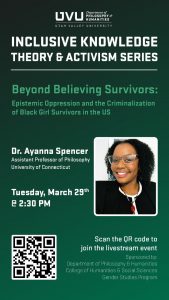Check out Professor and Department Head Lewis Gordon in a recent article published on The Chronicle of Higher Education titled “A Philosopher Laughs at Death — and the Public Listens.” Gordon discusses the German philosopher Martin Heidegger and his impact on society today.
**Excerpt from article**
Martin Heidegger exemplifies values suitable for people so enwrapped in themselves that they treat their own death as the end of the world,” he told me. “We really don’t need Heidegger today. We didn’t need him then, in his rector lectures at Freiburg in 1933, with his callous investment in cruel charismatic leadership as a form of salvation. Indeed, I would go so far as to argue we never needed him. We need people who transcend self-absorption, psychotic and sociopathic indifference to the suffering of others, and delusions of importance from societal systems designed to support their limited relationship to reality. We need compassion, courage — something Heidegger lacked — and a clear understanding of institutions of power.




